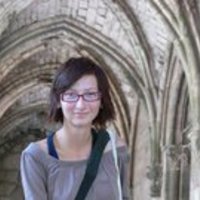Katarina Valova
Academy of Sciences of the Czech Republic, Institute of Archaeology, Department Member
•
Výzkum Pražského hradu v červnu roku 2015 oslaví 90 let své existence. Za tu dobu se vypracoval na pracoviště se samostatnou koncepcí, vlastními výzkumnými projekty a širokým personálním obsazením. Od roku 2007 je zařazeno do struktury... more
Výzkum Pražského hradu v červnu roku 2015 oslaví 90 let své existence. Za tu dobu se vypracoval na pracoviště se samostatnou koncepcí, vlastními výzkumnými projekty a širokým personálním obsazením. Od roku 2007 je zařazeno do struktury Archeologického ústav AVČR, Praha, v. v. i. jako
pracoviště Oddělení záchranných výzkumů vedeného Janem Frolíkem. V roce 2005, při 80. výročí, byly představeny hlavní výsledky práce hradního týmu od roku 1925. Letošní kolokvium se soustředí především na práci posledních deseti let a její odborný a společenský
impakt. Do první poloviny budou zařazeny příspěvky, které představují nebo hodnotí aktivity mezi lety 2005–2015, do druhé poloviny pak vyžádané příspěvky od mezioborových kolegů nebo příjemců výsledků naší práce, které by měly být inspirovány několika předem položenými otázkami.
pracoviště Oddělení záchranných výzkumů vedeného Janem Frolíkem. V roce 2005, při 80. výročí, byly představeny hlavní výsledky práce hradního týmu od roku 1925. Letošní kolokvium se soustředí především na práci posledních deseti let a její odborný a společenský
impakt. Do první poloviny budou zařazeny příspěvky, které představují nebo hodnotí aktivity mezi lety 2005–2015, do druhé poloviny pak vyžádané příspěvky od mezioborových kolegů nebo příjemců výsledků naší práce, které by měly být inspirovány několika předem položenými otázkami.
Publication Date: Jun 3, 2015
Research Interests:
•
"Qualis vita, finis ita." Non-standard burials at Great Moravian localities and two views on this problem - a result of the belief in revenants (cultic interpretation) or a reflection of social differences (social interpretation)?more
by Šárka Krupičková and Katarina Valova
Research Interests:
•
The early Middle Ages are considered the formative period among the cultural layers of modern Europe; at that time Christianity was adopted, new forms of government were established, and the first new empires developed. This paper... more
The early Middle Ages are considered the formative period among the cultural layers of modern Europe; at that time Christianity was adopted, new forms of government were established, and the first new empires developed. This paper concentrates on the interpretation of the formation of the cultural and political identity of Central Europe during the early Middle Ages, especially the Czech and Slovak Republics, with a focus on archaeological data. Both have entered the history of present-day Europe with its Christian roots in the ninth to eleventh centuries, during the time of a new consolidation under Charlemagne and his successors. They are characterised by a wave of Slav settlement, the development of local dynasties and close ties to the Frankish kingdom, of which they never became an integral part. Since the nineteenth century this historical period has been subject to national and nationalist interpretations; it was one of the pillars of the formation of national states, and its manipulation also represents a part of the Communist ideology. Local scholars have not yet been able to view this period in its broader European context.
Research Interests:
•
Prague Castle offers a unique example of continuous settlement and uninterrupted human activity for more than a thousand years. It became the seat of the secular as well as sacral administration of the Přemyslid Princedom and of all later... more
Prague Castle offers a unique example of continuous settlement and uninterrupted human activity for more than a thousand years. It became the seat of the secular as well as sacral administration of the Přemyslid Princedom and of all later Central European states with Prague as their capital as well.
